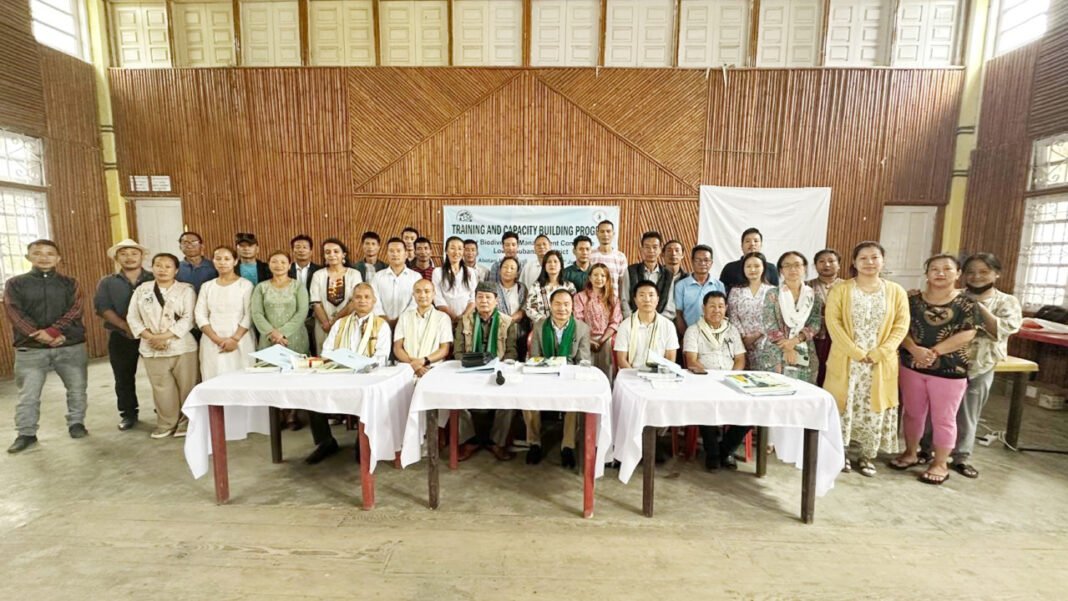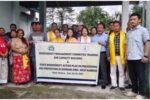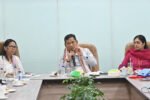HT Correspondent
ZIRO, June 23: In a concerted push towards strengthening grassroots biodiversity governance and conservation in Arunachal Pradesh, the Arunachal Pradesh Biodiversity Board (APBB) organised a Training and Capacity Building Programme for the Biodiversity Management Committee (BMC) of Lower Subansiri district at Ziro on Friday.
The initiative, aimed at empowering local stakeholders with the knowledge and tools necessary for sustainable biodiversity management, was conducted as part of the state’s commitment to its Biodiversity Strategy and Action Plan 2025–2035.
According to an official statement issued by the APBB, the programme was designed to sensitise BMC members, traditional leaders (Gaon Buras), line department officials, technical experts, and local residents about their critical role in preserving the unique and fragile ecosystems of Arunachal Pradesh.
The event began with a welcome address by Dr Bamin Yakang, research officer at the State Biodiversity Board, who laid emphasis on the urgent need for collective stewardship in preserving the state’s rich natural heritage.
She highlighted that local communities are the first responders to changes in biodiversity and ecosystem health, and equipping them with the right knowledge is key to ensuring long-term conservation outcomes.
In his keynote address, H B Abo, IFS, member secretary of the APBB, underscored the importance of community participation, capacity building, and aligning biodiversity conservation goals with the United Nations Sustainable Development Goals (SDGs).
He noted that effective implementation of biodiversity action plans requires strong institutional support from both government departments and village-level institutions.
As part of the technical sessions, Dr. Bamin Yakang provided a detailed presentation on the Biological Diversity Act, 2002, and the recent BD (Amendment) Act of 2023.
She explained the legal responsibilities of Biodiversity Management Committees, Panchayati Raj Institutions, and other local bodies in preparing and updating the People’s Biodiversity Register (PBR).
Dr Yakang also stressed the significance of access and benefit-sharing mechanisms that ensure equitable distribution of resources arising from biodiversity use.
Addressing the pressing issues faced by local farmers, Millo Tara, horticulture development officer, discussed sustainable agricultural practices, the importance of preserving indigenous plant species, and the application of modern water conservation techniques such as drip irrigation.
He called upon farmers to adopt organic methods and prioritise the cultivation of native horticultural crops for ecological and economic resilience.
Adding to the discourse, Koj Hormin from the Agriculture Department spoke about the emerging threat posed by wild black grasshopper infestations in the region, linking it to ongoing climatic fluctuations.
He advocated for the implementation of eco-friendly pest management strategies and encouraged the community to avail government schemes such as the ATMA Krishi Yojana to mitigate crop losses.
From the fisheries sector, Lyagi Lasa of the Division Fishery Department presented a comprehensive strategy to boost local fish production.
He advised communities to move towards sustainable fishery practices that not only ensure food security but also prevent environmental degradation, particularly in fragile paddy ecosystems which serve as important water and soil reservoirs.
K S Rab, scientist in-charge of the Zoology Division at the State Forest Research Institute (SFRI), gave a data-rich presentation on the exceptional biodiversity of Arunachal Pradesh.
He highlighted the presence of over 200 mammal species, 115 reptile species, 65 amphibians, between 850 to 900 butterfly species, more than 6,000 arthropods, and 260 varieties of freshwater fish.
Rab warned that without adequate protective measures, these ecosystems could come under severe threat.
He called for the integration of biodiversity conservation with livelihood generation through ecotourism, bio-prospecting, and traditional practices.
Ashwini Krishna, consultant to the Biodiversity Board from Nativefolks Pvt Ltd, elaborated on the State Biodiversity Strategy and Action Plan (SBSAP), providing an overview of upcoming projects under the ten-year vision.
She advocated for incorporating indigenous knowledge systems and local traditions into mainstream conservation approaches, ensuring that community values are upheld while promoting scientific sustainability.
The programme also served as a platform for dialogue between local bodies and government officials, aiming to strengthen inter-departmental coordination and encourage joint responsibility for biodiversity protection and rural development.
The event concluded with a vote of thanks from Guchi Nigma, junior research fellow at the Arunachal Pradesh Biodiversity Board, who acknowledged the active participation of all stakeholders and reaffirmed the Board’s commitment to continued engagement and support for local biodiversity initiatives.
The training marked an important step in decentralising biodiversity governance in Arunachal Pradesh and reaffirmed the state’s resolve to safeguard its ecological wealth through inclusive, community-driven efforts.












